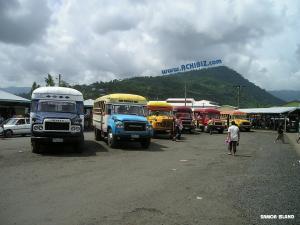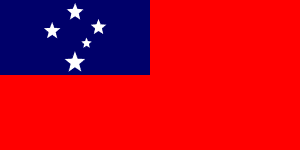 Guide For Offshore Corporate Services In Samoa
Guide For Offshore Corporate Services In Samoa
About Samoa
Jacob Roggeveen, a Dutchman, was the first known European to sight the Samoan islands in 1722. This visit was followed by French explorer Louis-Antoine de Bougainville, who named them the Navigator Islands in 1768 because of the Samoans’ seafaring skills. Samoa was formed on 14 June 1889. The Independent State of Samoa, known as Western Samoa until 1997, is made up of nine volcanic islands, two of which – Savai’i and Upolu – make up more than 99% of the land. It was governed by New Zealand until its people voted for independence in 1961. Western Samoa was admitted to the United Nations on 15 December 1976.
In 1878 the United States signed a treaty for the establishment of a naval station in Pago Pago Harbour. An 1899 agreement between colonial powers divided Samoa into spheres of influence: Germany gained control of the western islands, and the United States took the eastern islands.
Samoa is known as the “Cradle of Polynesia” because Savai’i island is said to be Hawaiki, the Polynesian homeland. Samoan culture is undoubtedly central to Polynesian life, and its styles of music, dance, and visual art have gained renown throughout the Pacific islands and the world.
Samoa lies south of the equator, about halfway between Hawaii and New Zealand, in the Polynesian region of the Pacific Ocean. The total land area is 2,842 km2 (1,097 sq mi), consisting of the two large islands of Upolu and Savai’i (which together account for 99% of the total land area) and eight small islets.
Samoans are mainly of Polynesian heritage, and about nine-tenths of the population are ethnic Samoans. Euronesians (people of mixed European and Polynesian ancestry) account for most of the rest of the population, and a tiny fraction are of wholly European heritage.
The traditional culture of Samoa is a communal way of life based on Fa’a Samoa, the unique socio-political culture. In Samoan culture, most activities are done together. There are 3 main parts in the Samoan culture, that is faith, family and music. One’s family is viewed as an integral part of a person’s life.
Part of America: In 1878 the United States signed a treaty for the establishment of a naval station in Pago Pago Harbour. An 1899 agreement between colonial powers divided Samoa into spheres of influence: Germany gained control of the western islands, and the United States took the eastern islands. American Samoa, officially Territory of American Samoa, unincorporated territory of the United States consisting of the eastern part of the Samoan archipelago, located in the south-central Pacific Ocean.
Although Samoans have travelled to New Zealand since the early 1900s, it was not until the 1950s that they migrated in large numbers. Many Samoans moved to New Zealand for greater opportunities and a better education for their children.
Soma’s rivers are shallow, are limited in extent, and radiate directly from the central highlands to the coast. The islands are rocky, formed by volcanic activity that progressed from east to west within the past seven million years. They are ringed by coral reefs and shallow lagoons except where the shorelines are marked by cliffs formed by lava flows. Mount Matavanu on Savai‘i last erupted intermittently during 1905–11. Samoa’s volcanic soils support lush vegetation but are easily eroded by runoff.
Infrastructure
Samoa has few natural resources apart from its agricultural lands, surrounding waters, and pleasant scenery and climate; nearly half of the land area is covered by forests. Hydroelectric power provides most of the country’s energy needs; petroleum-fired thermal generators account for much of the remainder.
About two-fifths of Samoan roadways are paved, including many coastal highways and the major streets of Apia. International flights connect the islands with American Samoa, Fiji, New Zealand, Australia, and Japan. Regular shipping services link with ports abroad, including those in Hawaii and California to the northeast and Fiji, New Zealand, and Australia to the southwest. There are no railways.
Samoa has several thousand telephones in use, as well as international phone connections via undersea cable and satellite.
Economy
A cash economy developed following European contact, mainly based on agricultural exports ties up close kinship within the villages traditionally bound Samoans into a collectivist society. Tourism, services, and light manufacturing became increasingly important after 1950. Other major sources of capital now include remittances from Samoans living abroad (mainly in the United States and New Zealand), which account for as much as one-sixth of household income, and grants from the United States, the United Nations, the Commonwealth, and other foreign entities.
Agriculture accounts for two-fifths of Samoa’s gross domestic product (GDP) and nearly two-thirds of the workforce; however, production does not meet local demand, and large quantities of food are imported. Major crops include coconuts, taro, pineapples, mangoes, and other fruits.
Samoa has a persistently negative balance of trade. Major trading partners include New Zealand, China, Australia, the United States, and Japan. Food, industrial supplies, machinery, consumer goods, and petroleum products are the main imports. Coconut products, copra, cacao, and beer account for a majority of exports.
Type of Law
In 1962 Samoa promulgated its constitution as the first independent microstate in the Pacific region, and in 1970 it joined the Commonwealth. Samoa has a parliamentary government that blends Samoan and New Zealander traditions. The constitution originally provided for a constitutional monarchy.
Central Bank
The money supply is controlled and regulated by the Central Bank of Samoa, which was established in 1984. Samoa also has several commercial banks. Banking and finance account for only a tiny fraction of employment, although numerous companies have registered in Samoa since offshore banking services were initiated in 1988.
Anti-Money Laundering: FATF Status
The Independent State of Samoa is not known to have major organized crime, fraud, or drug problems and due to the small size of the local economy and the banking sector, Samoa has not become a haven for money laundering or terrorism financing.
The mutual evaluation report (MER) of Samoa was adopted in July 2015.
This follow-up report analyses the progress of Samoa in addressing the technical compliance deficiencies identified in its MER. Re-ratings are given where sufficient progress has been made.
Samoa reported progress to address the technical compliance deficiencies identified in the MER. As a result of this progress, Samoa has been re-rated on Recommendations 3, 5 and 10.
Samoa is not blacklisted on any OECD, FATF or other international organizations list.
Member of APG:
The Asia/Pacific Group on Money Laundering (APG) is an autonomous and collaborative international organisation founded in 1997 in Bangkok, Thailand consisting of 41 members and a number of international and regional observers. Some of the key international organisations who participate with, and support, the efforts of the APG in the region include the Financial Action Task Force (FATF), International Monetary Fund, World Bank, OECD, United Nations Office on Drugs and Crime, Asian Development Bank and the Egmont Group of Financial Intelligence Units. APG members and observers are committed to the effective implementation and enforcement of internationally accepted standards against money laundering and the financing of terrorism, in particular the Forty Recommendations of the FATF.
Corporate Entities
Samoa provides individuals and companies an outstanding jurisdiction in an idyllic environment to form an offshore company. The islands are located near the equator, giving tourists and residents a warm temperature climate year around.
Samoa’s International Finance Authority (SIFA) administers and regulates the offshore financial market, under the auspices of the Central Bank of Samoa. The government has passed a number of pieces of legislation that have continued to create a safe, credible and liberal offshore financial market, through the adoption of several different pieces of legislation, including:
- International Companies Act 1987
- International Trusts Act 1987
- The Offshore Banking Act 1987
- The International Insurance Act 1988
Taxation
All Samoan international offshore companies are free from all local taxation, which includes, but is not limited to taxes on profits, capital gains, transactions, and contracts.
 Registration of Offshore Companies
Registration of Offshore Companies
The Samoan International Financial Services Authority (SIFA) regulates the Samoan offshore sector since 2005 and offers two main offshore formation products and both of which offer clients superb offshore products in a highly supportive jurisdiction:
- an International Company (IC); and
- a Limited Life Company (LLC),
Samoa does not have a negative association in the world of offshore banking or offshore financial services though it has been pressured by the Australian government in recent times to reform its offshore industry which it has largely done in the last few years to appease global regulators.
The Samoan government entices international investors by modernizing its legislation and streamlining the company formation process, measures which have been largely successful.
A Samoan based offshore company has many advantages over a traditional onshore company. An offshore company is exempt from paying local taxes, submitting financial accounts, and any auditing requirements.
Samoan corporate legislation ensures confidentiality and minimal company formation requirements.
What activities can be carried out?
Following are the activities that can be legally carried out by an offshore company:
- Consulting services
- Advisory services
- General trading activities
- Buying, holding and selling shares of companies
- Commission agents
- Owning property
- Ship management
- Investments and joint investments
- International and professional services
General Features of Offshore Entities In Samoa |
|
| Type of Entity |
|
| Minimum Government Fees (Excluding Taxation) |
|
| Corporate Taxation |
|
| Double Taxation Treaty Access |
|
Share Capital |
|
| Standard Currency |
|
| Permitted Currencies |
|
| Usual Authorized |
|
| Minimum Paid-up Capital |
|
| Bearer Shares Allowed |
|
| No Par Value Shares Allowed |
|
Directors or Managers |
|
| Minimum Requirement |
|
| Requirement of Local Resident |
|
| Corporate Directorship Allowed |
|
| Public Access to Company Records |
|
| Required Location of Meetings |
|
Members |
|
| Minimum Number |
|
| Public Access to Company Records |
|
| Required Location of Meetings |
|
Company Secretary |
|
| Requirement of Company Secretary |
|
| Local or Qualified |
|
Accounts |
|
|
Requirement to Prepare |
|
| Audit Requirements |
|
| Requirement to File accounts |
|
| Public Access to Accounts |
|
Annual Return |
|
| Requirement to File Annual Return |
|
Others |
|
| Permission for change of Domicile |
|
Specific Features of Offshore Companies In Samoa |
|
| Currency |
|
| Language |
|
| Exchange Control |
|
| Principal Corporate Legislation |
|
| Type of Company for International Trade and Investment |
|
| Restrictions on Trading |
|
| Powers of Company |
|
| Language of Legislation and Corporate Documents |
|
| Language of Name |
|
| Requirement of Registered Office |
|
| Name Restrictions |
|
| Names Requiring Consent or Licence |
|
| Suffixes to denote Limited Liability |
|
| Disclosure of Beneficial Ownership to Authorities |
|
TERMS AND CONDITIONS:
|
 24/7/365
24/7/365
